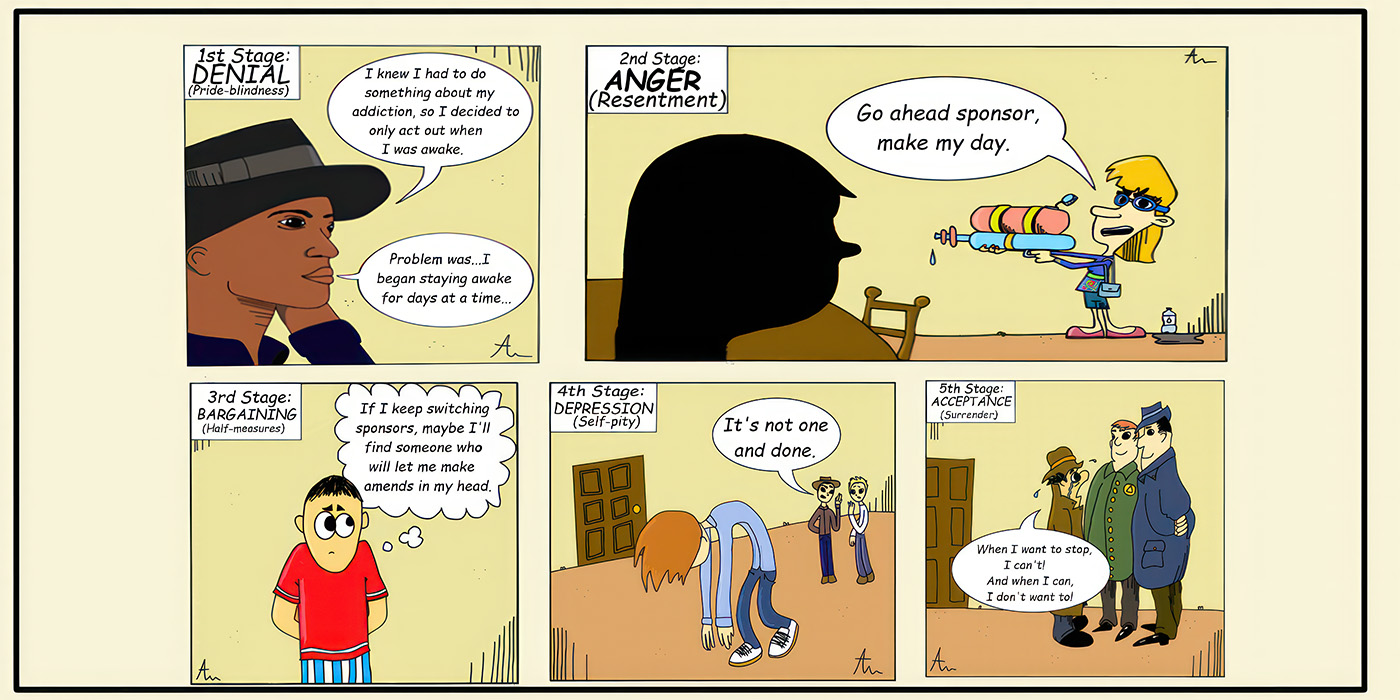
“Meetings, meetings, meetings, meetings, meetings…” That’s what they told me. “Just keep bringing the body”- preamble to the Eighteen Wheeler. At the end of the meetings I attend we gather in a circle, hold hands, and say together, “keep coming back it works if you work it and you’re worth it.”
At first this was an odd ritual to me, as were other observances during a typical SA meeting. But over time, its assurance keeps bringing me back when I feel like skipping a meeting. One of the most courageous acts a sex addict can do is return to a meeting after a relapse. Fifteen months ago I relapsed. I had gone to Arizona to work on our place down there. While I was there, I met four different people over the course of a month for sex. My wife found out and asked me to leave. It was December, and I moved out to live with friends through the Christmas season. I wasn’t welcome at the family holiday gathering with my two sons and their families, including four grandkids. I was lonely and devastated, but I kept going to the four meetings a week that I’d been going to for six years. I often felt like I didn’t want to go and thought I was a recovery failure. But, I kept coming back.
Last year was a low point — another bottom. The first low point was five years prior when I came out to my wife about the double life I’d been living for most of our forty years together. Of course she was devastated by the deep betrayal. The lies I’d been living created a paradigm in which she didn’t know what was real. The reality she’d been living in with me was shattered into so many pieces that life as she knew it would never be put back together. Everything changed. I could see her pain but couldn’t do anything about it. I didn’t know who I was. Was I Dr. Jekyll or Mr. Hyde? I started attending SA meetings. The first few months of meetings were confusing, uncomfortable, and unnerving. I thought of quitting many, many times, but I kept coming back. In the fellowship, we call people who have trouble maintaining sexual sobriety, chronic slippers. I am one of those people. During the first five years in recovery I would have up to several months of sobriety, but then I’d masturbate, sometimes to porn. Each time I’d feel the heat of shame rise in my cheeks.
I considered myself a failure but was never labeled as such by my comrades in recovery. I’d mask my relapses by saying “sober today” at the beginning of meetings. I would tell myself that sobriety wasn’t that important. How could anybody go months or years without experiencing an orgasm? I certainly couldn’t. When I heard that half measures availed us nothing, it was like chewing on sand — hard, gritty, and grinding away the rough edges of my soul, deeply calloused from years of acting out. I wouldn’t talk about my relapses, but I kept coming back.
The wages of continually acting out come due when masturbating is not enough. Our disease is progressive. When I acted out with four guys fifteen months ago, I knew I was in trouble, but I minimized the impact. I told myself and others that I’d get back on track without being thoroughly honest about what I had done. My resolve lasted a few months, but then the vacuum of hiding the whole truth sucked me into more sex with more men. Week after week, month after month, I stayed lust drunk. My shares at meetings were superficial. Sometimes I’d share from a place of calculated vulnerability—just enough truth to keep my fellows at bay. I was miserable, but I kept coming back. My wife and I are legally separated now. The emotional equity we’d acquired through forty years of marriage has been used to come to an amicable separation agreement. We still talk regularly. Our relationship has returned to a deeper friendship than we had before we were married but that we’d lost over time because of my lack of honesty. I feel rejected. I’m lonely. I eat dinner alone most nights. My family is broken, but thankfully I still see my sons and grandkids.
Sometimes when I go to meetings, the pain of loss intensifies when I’m reminded by another’s share of the things I have done. Sometimes I’m not very happy at a meeting — when it hits too close to home. But, I keep coming back.
I have a close program friend who recently checked into a treatment program. He shared in a letter how suffering is inevitable. He said that meaning in life emerges from a person’s reaction to suffering. Suffering is a process of purification. I don’t want to suffer, especially when it comes from my own selfish actions. But it approaches none-the-less, like a grim reaper coming to take a scythe to my soul. In God’s hands, suffering is a resource through which we are refined, melted down like gold ore. The impurities are skimmed off the top. Purification is painful. It hurts to see how my relapses have impacted the lives of friends in the fellowship, but I keep coming back. It takes courage to come back to a meeting after acting out the night before. I feel defeated. I’m worried what people will think about me. I fear if I tell someone about what happened that they won’t like me. I don’t want to experience rejection again. My addict brain is telling me, “Just skip the meeting this one time. You’ll be fine!”
But I keep coming back.
Tim K., Washington, USA






